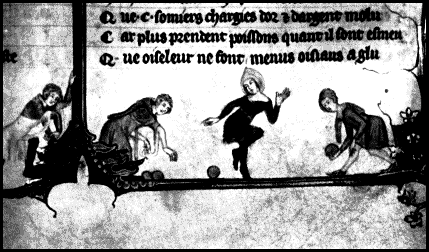
Etymology of the
English Language
The Coming of
The Word "Lady"If we omit the Dark Ages, and, turning suddenly from the civilization of classical Greece and Rome, raise the curtain on, say, thirteenth-century England, we are struck by a remarkable transformation. An attempt has been made in previous chapters to trace the general changes of meaning in certain key-words of human thought and feeling, such as God and love, life and death, heaven and hell. When we reach medieval Europe, it is necessary to add a new class of key-word altogether. Let us look at a fifteenth-century English carol:
I sing of a maiden
That is makeless[matchless];
King of all kings
To her son she ches[chose].He came al so still
There his mother was,
As dew in April
That falleth on the grass.He came al so still
To his mother's bour,
As dew in April
That falleth on the flour.He came al so still
There his mother lay,
As dew in April
That falleth on the spray.Mother and maiden
Was never none but she;
Well may such a lady
Goddes mother be.In such a poem we have once more a kind of cross section of the growth of European outlook. Between its lines we seem to be able to hear, as in a dream, the monotonous intonings of Egyptian priests, the quiet words of Socrates in the Academy, and the alert speculative hum of the Alexandrian world. It is so graceful that for the moment it seems as though all these things, with all the pillages and massacres and crucifixions and vast imperial achievements of Rome, had been conspiring together merely to load the homely old Teutonic word "loaf-kneader" with new semantic significance, to transform it into that mystery and symbol in the imaginations of men, a lady.
The medieval lyric, as it gradually loses its exclusive preoccupation with ecclesiastical subjects, becomes more and more concerned with woman, and concerned with her in a new way. Through the poetry of Italy, where the Renaissance was already stirring, the troubadour literature of France, and that strange "Rose" tradition which is preserved to us in Chaucer's translation of the Roman de la Rose, there grew up during the thirteenth and fourteenth centuries a small special vocabulary defining the landmarks in that new region of the imagination which the poets, and even the scholars, of Europe were just discovering; we might call it the region of devotional love. Indeed, it was more than a vocabulary; it developed at one time into a sort of miniature mythology, for the various conflicting elements in a lady's disposition which the lover had to meet with and overcome were actually personified, "Danger" being a kind of mixture of modesty and haughtiness --- an ill-omened creature whom "Pity" or "Mercy," if the lover was fortunate, formally put to rout:
Al founde they Daunger for a tyme a lord,
Yet Pitee, thurgh his stronge gentle might Foryaf [Forgave] and made Mercy passen Ryght.In these three lines from Chaucer's Legend of Good Women the four Anglo-French words Danger, Pity, Gentle, and Mercy are all Latin terms whose forms had altered, and whose meanings had received the Christian stamp during the Dark Ages.
--- From History in English Words
Owen Barfield
©1967 Lindisfarne Books
